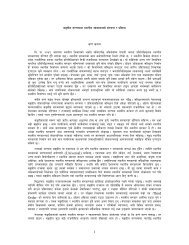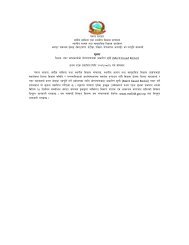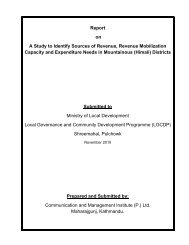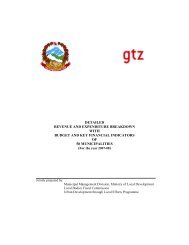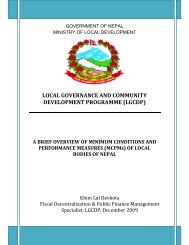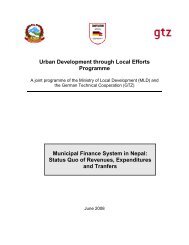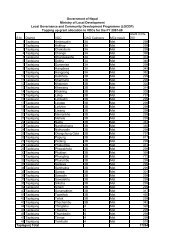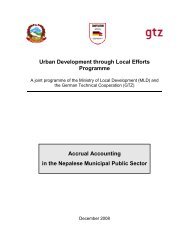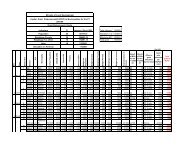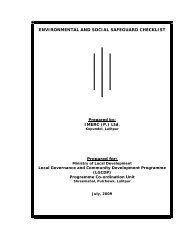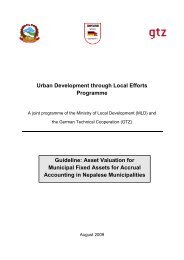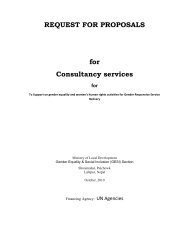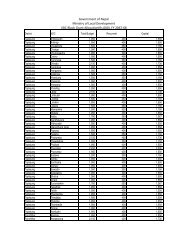GTZ Report on Proposal for Nepal Grant Formula - LGCDP
GTZ Report on Proposal for Nepal Grant Formula - LGCDP
GTZ Report on Proposal for Nepal Grant Formula - LGCDP
You also want an ePaper? Increase the reach of your titles
YUMPU automatically turns print PDFs into web optimized ePapers that Google loves.
<strong>Proposal</strong> <strong>for</strong> a municipal grant allocati<strong>on</strong> <strong>for</strong>mula 9<strong>Proposal</strong> <strong>for</strong> a new local government taxati<strong>on</strong> system in a federal <strong>Nepal</strong>they may be c<strong>on</strong>cerned that a government not receiving the revenue from a tax that it ad-ministers is likely to feel less urgency in collecti<strong>on</strong> of or <strong>for</strong> re<strong>for</strong>m of that tax than are those using the revenue to oinance their operati<strong>on</strong>s. They may feel that administrati<strong>on</strong> in practice is inextricably intertwined with tax policy and that, without having choice over administrative decisi<strong>on</strong>s, they lack appropriate oiscal aut<strong>on</strong>omy” (Mikesell 2003).In the c<strong>on</strong>text of <strong>Nepal</strong>, the number of taxpayers <strong>for</strong> high-‐yielding taxes such as individual or corporate income tax, value-‐added tax or others is still low. However, Government might c<strong>on</strong>sider surcharges to increase the overall revenues from these taxes, as there are still a large number of potential taxpayers de facto “exempted” from tax invoices.2.2.2 A reas<strong>on</strong>able sharing of taxes between levels of governmentThe large importance of the LDF to local government funding in <strong>Nepal</strong> (at the moment limited to muni-cipalities) raises the questi<strong>on</strong> which income might replace the LDF when abolished. It is rather evident that given the relatively large number of revenue titles that are assigned to <strong>Nepal</strong>ese municipalities no single additi<strong>on</strong>al “new” tax can be created to replace the high-‐yielding LDF.An alternative and more efoicient way to equip local governments with revenue is to better exploit the shared revenue between central and local governments. We can expect beneoits of tax sharing such as reduced tax competiti<strong>on</strong> am<strong>on</strong>g local governments, ec<strong>on</strong>omies of scale in tax administrati<strong>on</strong> and collecti<strong>on</strong>, and the maintenance of revenue stability over the business cycle etc. However, there are also downsides of the tax sharing scheme, due to disadvantages such as a reducti<strong>on</strong> in local aut<strong>on</strong>omy and the breaking of the link between the beneoits and costs of local public expenditure (Mikesell 2003).This fact is an argument to broaden the tax bases of the current taxes (see the secti<strong>on</strong> above). However, even with a broadening of the tax bases of the current local taxes in <strong>Nepal</strong> – especially the integrated property tax and the business tax as the potentially most important local taxes in the future – there is a need to replace the current grant allocati<strong>on</strong> scheme and the LDF redistributi<strong>on</strong> through a system of shared taxes.Shared taxes are very comm<strong>on</strong> in federal states. In Germany, <strong>for</strong> example, there are a number of taxes which are shared between the federal level and the state level, and there are provisi<strong>on</strong> that guarantee local governments a share. This is the case <strong>for</strong> the distributi<strong>on</strong> of the value-‐added tax, the pers<strong>on</strong>al in-come tax and tax <strong>on</strong> capital gains. Local governments in Switzerland levy supplements to cant<strong>on</strong> individual income taxes (see Mikesell 2003). Each of the twenty-‐six Swiss cant<strong>on</strong>s has its own tax system and local governments are entitled to levy taxes to the extent authorized by the cant<strong>on</strong>. The communal tax is levied as a percentage or multiple of the basic cant<strong>on</strong> tax rate. A federal law requires cant<strong>on</strong>s to harm<strong>on</strong>ize their income tax c<strong>on</strong>cept and deducti<strong>on</strong>s with the federal base, but they may set the amount of deducti<strong>on</strong>s and their rate schedules. Each of the cant<strong>on</strong>s has a separate administrative body <strong>for</strong> collecti<strong>on</strong> of its taxes. The communal tax is piggybacked <strong>on</strong> the cant<strong>on</strong> tax and federal tax is reported <strong>on</strong> the cant<strong>on</strong> return. Thus, the cant<strong>on</strong> is resp<strong>on</strong>sible <strong>for</strong> assessing and collecting federal, cant<strong>on</strong>, and communal income tax – cent-ralizati<strong>on</strong> down from the cant<strong>on</strong> but decentralized administrati<strong>on</strong> up to the federal level. In c<strong>on</strong>trast to the case in many nati<strong>on</strong>s, subnati<strong>on</strong>al – cant<strong>on</strong> and municipal – Swiss governments receive the bulk of income tax collecti<strong>on</strong>s, not the federal government. And, again in c<strong>on</strong>trast to most internati<strong>on</strong>al exper-ience, the income tax is a relatively modest revenue source <strong>for</strong> the federal level. But because the tax is collected across all cant<strong>on</strong>s, it is important that the base and deducti<strong>on</strong>s be standardized in order that Dr Alexander Wegener interpublic c<strong>on</strong>sultancywww.interpublic-‐berlin.de



